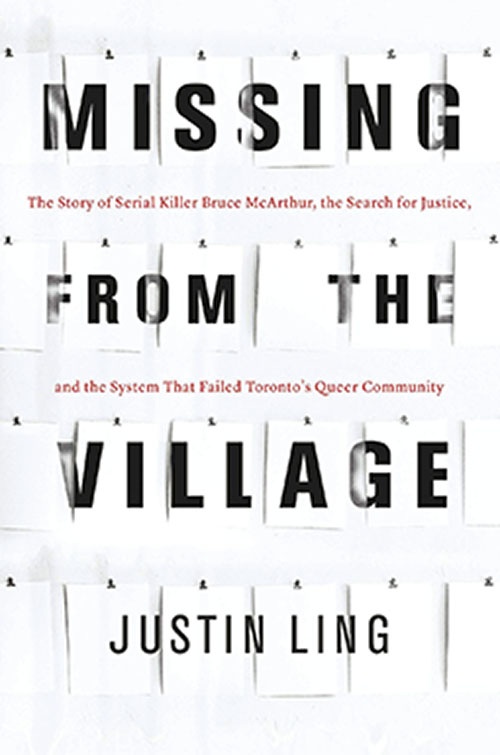
The Fall 2020 Book Room
Fall reads from Justin Ling, Marlowe Granados, Marc Herman Lynch and others.
Missing from the Village
In the early 2010s, Toronto’s gay village feared the worst: a serial killer. Several people, loosely connected by race and sexuality, had disappeared. For years, Toronto police, which already had a troubled relationship with the LGBTQ+ community, denied the possibility. Eventually, Bruce McArthur was arrested and charged for three—and later eight—murders. This year, as calls to defund the police move into the mainstream, Justin Ling’s new book Missing from the Village (McClelland & Stewart) is meant to be “both a ringing endorsement of the idea and a note of caution,” he writes. Having reported on McArthur’s case for local news outlets, including Vice and the Globe and Mail, Ling paints a detailed picture of the events leading up to McArthur’s sentencing. By piecing together the city’s queer history, the lives of those murdered, and the police investigation that spanned nearly a decade, Ling exposes the systemic racism and homophobia that still plague Canada. Missing from the Village is a thrilling and chilling account of the horrors Toronto’s queer community has faced, and also a portrait of its resilience. The book leaves readers with an important question: how will we prevent a tragedy of such magnitude from happening again?—Erika Morris
Happy Hour
Happy Hour (Flying Books) is effervescent and hangover free. Marlowe Granados’s debut novel follows Isa and Gala, childhood friends floating through a summer in New York City on waves of charm, serendipity and social gymnastics. But these protagonists are broke, a dilemma that dictates much of what they can and can’t do. The delight in Happy Hour is watching the young women construct a glamorous summer out of odd jobs and sheer will. The confidence of their aimlessness saves the story from being a tired addition to the moving-to-NYC genre. Isa didn’t come to the city to be a writer, or an artist, or an actor, but just to be. “It’s funny how in a place where everything is an Experience, people see such little value in just living,” she quips. With a release date at the height of mid-pandemic restlessness, and a narrative packed with party scenes and adventures with strangers, this novel is the perfect fix for holed-up party girls or anyone who wishes they’d been a bit more wild in their early twenties.—Madeline Lines
Shared Universe
Unlike most anthologies, Paul Vermeersch’s recent poetry collection—containing some previously published work as well as some new—eschews chronology and instead divides his work by theme, from nature to humanity to prophetic visions. It’s a strangely comforting format during these times, when life feels less like a chronology than a hodgepodge of the unusual. The poems in Shared Universe (ECW Press) often open with a single, vivid image, transporting the reader into worlds both mundane and dystopian. In “Dogstar,” readers see through the eyes of Laika, the first dog to orbit Earth, as she whimsically considers the landscape below her. But when we think about the reality of her fateful flight—she died of panic as her space capsule overheated—the poem takes on a decidedly sinister quality. Throughout the collection, Vermeersch’s easy, conversational rhythm accompanies evocative diction (“birthdays turned necrotic”) and subversive structure (“God how he admired the scarecrow and Jesus/on the cross, sunken gut and ribs you can count”). He keeps his readers’ heartbeats miraculously steady, even as he turns their vision kaleidoscopic.—Steven Zhu
Nineteen
Korean cartoonist Ancco has made a name for herself through her candid explorations of difficult subjects, particularly the lasting impact of complicated friendships and abusive relationships. Her latest release doesn’t make for a light read, either. Nineteen (Drawn & Quarterly) is a melancholic blend of autobiographical and fictional coming-of-age tales set in modern-day Seoul. These stories examine private parts of contemporary Korean life—experiences shaped by pain, alcohol and violence. With her stark black-and-white sketches, Ancco shows what it’s like to live through a grandmother’s illness, a father’s violence and an overwhelming fear of growing up. In “Life,” a particularly moving story, she depicts a boy with HIV who fears telling his parents about his diagnosis. Nineteen is fuelled by angst and pain, but Ancco’s calm drawings convey an underlying longing for peace. The English translation by Vancouver-based translator Janet Hong is masterful; characters’ thoughts and dialogue feel so intimate that it’s hard to believe it’s a translation at all.—Albina Retyunskikh
Arborescent
Nohlan Buckles, Hachiko Yoshimoto and Zadie Chan are neighbours inside the Cambrian Court housing complex. From the outside, Cambrian Court may seem like an ordinary Montreal apartment building, but inside, the unusual imaginations of its tenants turn it surreal. Arborescent (Arsenal Pulp Press) introduces a series of misfits who long to escape their realities, each in their own way: the owner of a cyber café who worries about being forgotten by his peers, an artist consumed by superstition, and a high-school student who hides from the world behind an owl mask. Their wishes are granted, in a sense, when ghosts, doppelgängers and a resurrection interrupt their lives. Marc Herman Lynch is a first-generation French-Chinese immigrant, and he skillfully uses the supernatural to explore Asian identity and the immigrant experience—how a person’s feeling of otherness in a new space can lead to a sense of alienation in their own body. “When we abandon our roots for fantasies, we become ghosts,” he writes. With dark humour and rich language, Lynch explores the sullen, twisted worlds that can exist in one’s mind. Arborescent will leave you questioning reality: enter at your own risk.—Christine Jean-Baptiste





